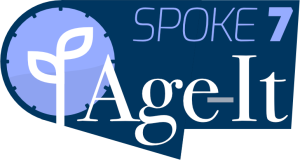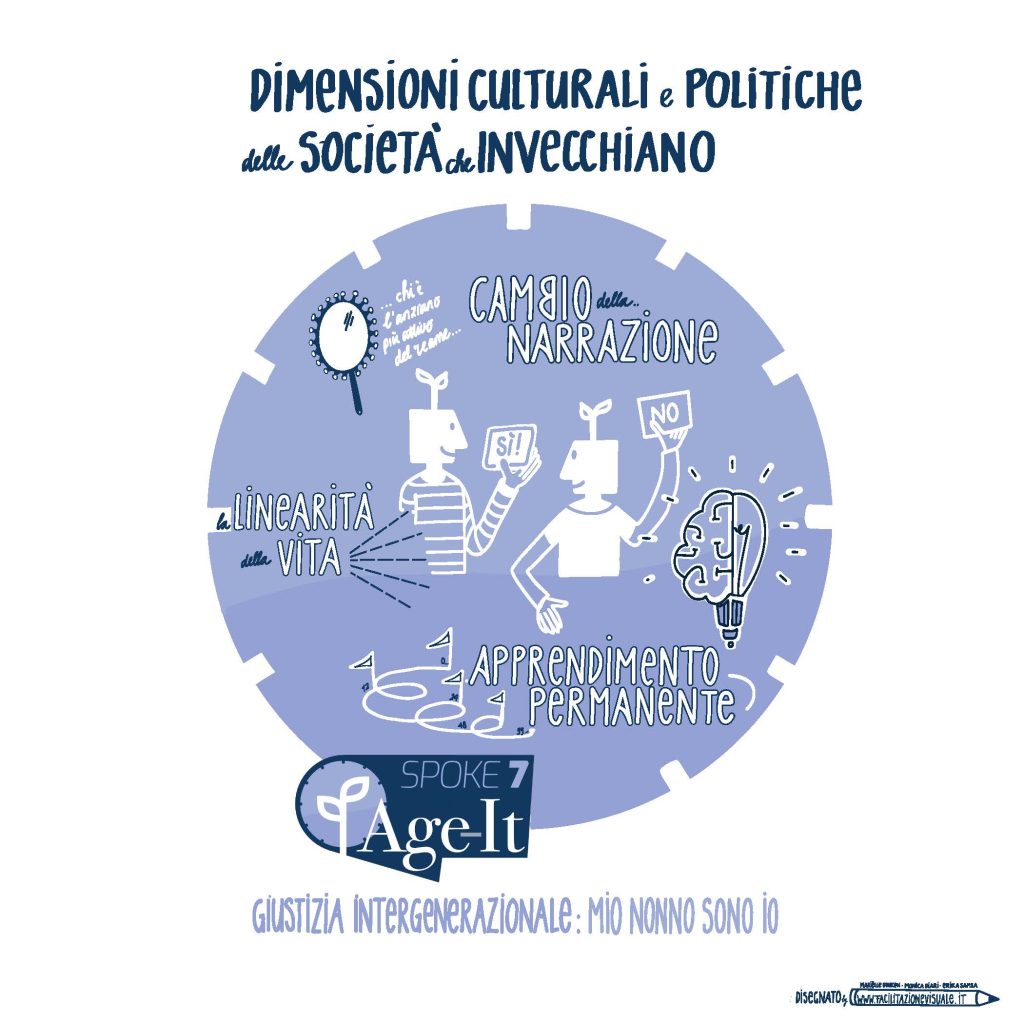
Dimensioni culturali e politiche delle società che invecchiano
Leader: Vincenzo Galasso, BOCCONI
Co-Leader: Elisabetta Galeotti, UPO
Affiliati: UNIBO, UNISR, UNIBA, UNICAL, UNIVE, GENERALI, INPS
Spoke Themes
Questo Spoke affronta le problematiche di natura culturale e politica che emergono dall’invecchiamento della popolazione, utilizzando un approccio olistico e multidisciplinare. Sviluppa una cornice normativa per affrontare le questioni dell’equità intergenerazionale e dell’inclusione, e valuterà la sostenibilità politica di varie politiche intergenerazionali. Lo Spoke 7 contribuisce alla comprensione delle determinanti culturali sia delle decisioni individuali, sia di quelle sociali, fornendo anche delle linee guida e dei consigli legali per implementare soluzioni tecnologiche e politiche che portino allo sviluppo di una società age-friendly in futuro.
Structure
Activities are organised around 5 WPs. Two WPs (WP1 and WP4) deal with the analysis of intergenerational politics. Together, they provide a model for intergenerational justice. Two WPs address diversity and inequality (WP2) and cultural aspects (WP3) of aging. WP5 provides the legal framework.
Disciplines
Demography, economics, sociology, law, political philosophy and political science.

Work Packages
Prof. Anna Galeotti, UPO
WP1 deals with the several challenges to foster and maintain just relations among citizens within an ageing society. The WP tasks will analyse: 1) the determinants of unbalanced intergenerational relations and how they affect our societies; 2) ageism, prejudices, and discriminatory behaviours; 3) determinants of and interventions that can tackle age-related prejudice; 4) distributive effects of transport infrastructures in favour of the older population. The expected outcome of this WP are normative evaluations and operative prescriptions that could ease the tension between generations.
Prof. Paola Profeta, BOCCONI
This WP analyses the role of several dimensions of inequalities in shaping cultural and political aspects of ageing societies, adopting a gender lens. It will address: 1) how the current trends in ageing and the increasing presence of women into the labour market change the labour force composition; 2) how ageing and gender equality also interact in the private sphere, influencing family and intergenerational relationships; 3) how the ageing process challenges the role of grandmothers as childcare providers; 4) the distinctive context of domestic violence in later life from a gender perspective.
Prof. Marco Alberio, UNIBO
This WP tackles cultural aspects of ageing with a life course perspective. It aims to: 1) analyse scripts of life in ageing societies; 2) explore experiences and representations of ageing in the labour market, through an employer-employee perspective; 3) evaluate life quality and territorial policies for age-friendly cities in a gender perspective; 4) explore mobilities and migrations of Italian seniors examining cultural, political and socioeconomic aspects; 5) analyse cultural determinants and socio-cultural representations: justice and empathy in caring practices.
Prof. Vincenzo Galasso, BOCCONI
Ageing challenges the economic sustainability of intergenerational welfare state programs but increases the relative political power of their main supporters, older people, potentially leading to an “ageing trap.” WP4 will analyse the determinants of age-based political conflict: the cleavage in the political demand of intergenerational policies by older and younger people, which has been made more salient by events, such as the pandemic and global warming; and the political supply of different policy position and information by traditional and populist parties.
Prof. Maurizio Del Conte, BOCCONI
This WP addresses the legal issues raised by the ageing of our society using the perspective of a personally embedded qualitative social ontology. In this perspective, the relation among different generations constitutes a transgenerational whole, and legal provisions aiming to contrast age discrimination and inequality should be addressed to the transgenerational whole. This WP – working in close collaboration with Spoke 10 – will address several legal issues of ageing: age discrimination in employment contracts and in the labour market; inadequacy of contract models of care relationships between public welfare and private sector.
Key Outputs
- Indagine “Gender & Generation” (Genere & Generazione): traduzione e adattamento del questionario internazionale da somministrare nel 2024. Progettazione di questionari pilota
- Indicatore di Equità Intergenerazionale: identificazione di Indicatori Chiave di Performance, costruzione di sotto-indicatori, collaborazione internazionale
- First Internal conference for internal planning on May 2023.
- Design and Coordination of Survey and Survey Experiments.
- Gender & Generation Survey: translation and adaptation of the international questionnaire to be run in 2024. Design of pilots.
- Intergenerational Equity Indicator: Identification of KPI, construction of sub-indicators, International Partnership.
- Progettazione e contatti per lavoro sul campo qualitativo su qualità della vita, cura, mobilità (emigrazione) e invecchiamento nel mercato del lavoro
- Sviluppo di un quadro teorico all’interno del quale analizzare il conflitto politico basato sull’età: trade-off tra scambio delle risorse all’interno della famiglia e redistribuzione intergenerazionale nella società
- Data Collection of (i) indicators on spatial distribution of elderly, immigrants and external care services, ageing migrant women, gender-based violence and (ii) individual socio-demographic characteristics and care activities of women.
- Development of a theoretical framework of cultural aspects of aging: lifecourses and social threshold at old age, life quality and territory, care, mobility (emigration) and aging in the labor market.
- Design and contacts for qualitative fieldwork on life quality, care, mobility (emigration) and aging in the labor market.
- Development of a theoretical framework of age-based political conflict: trade-off between family exchange of resources and intergenerational redistribution in the society. Design and contacts for qualitative fieldwork on life quality, care, mobility (emigration) and aging in the labor market.
- Analysis of parties' electoral manifestos for measures of intergenerational redistribution. Design and contacts for qualitative fieldwork on life quality, care, mobility (emigration) and aging in the labor market.
- Design of survey experiment to elicit preferences for intergenerational transfer policies using new methods.
Design and contacts for qualitative fieldwork on life quality, care, mobility (emigration) and aging in the labor market.
- Legal Clinique in Bari & Milan: meeting with the territorial public authorities, defining activities, training volunteers.
